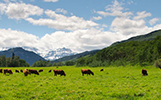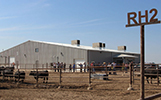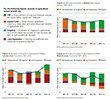| McDonald's Announces Commitments to Advancements in Chicken Welfare
McDonald's News Release | October 27, 2017
Today, we are elevating our global commitment to source chickens raised with improved welfare outcomes. We're proud to share the following eight commitments in markets across the globe,[1] which impact more than 70 percent of our global chicken supply and will be fully implemented on or before 2024. Together, we believe these commitments provide the ability to drive and measure continuous improvement for the health and welfare of chickens.
Canadian Roundtable for Sustainable Beef Seeks Final Public Input on Sustainability Indicators for Beef Processing: Comment Period Open October 5 – November 4, 2017 
The Canadian Roundtable for Sustainable Beef | October 05, 2017
The Canadian Roundtable for Sustainable Beef (CRSB) works collaboratively through its multi–stakeholder membership to promote sustainability in the Canadian beef industry.
As part of a Verified Sustainable Beef Framework the CRSB is developing, a series of sustainability indicators reflect what will be measured to evaluate sustainable practices across the beef value chain. The CRSB conducted an initial consultation on sustainability indicators for the beef processing sector this summer.
Based on the responses during the initial consultation, these indicators have been refined, and CRSB is now seeking additional public input on the updated draft. Comments received came from a variety of diverse perspectives, and CRSB appreciates all who offered their valuable feedback.
Panel Discusses Sustainability at Research Center Opening 
Kylene Scott, High Plains Journal | October 16, 2017
A panel of speakers ranging from World Wildlife Fund to McDonald's and Cargill, plus veterinarians, beef producers and genetics companies spoke about how each of their sectors will contribute to the sustainability of the beef industry at the opening of Hy Plains Feed Yard's Education and Research Center, Aug. 23, near Montezuma, Kansas.
To be sustainable, beef producers need to be environmentally sound, economically viable and socially responsible. It gets complicated when trying to define those three things. The roundtables for beef sustainability—which are happening around the globe—are working to achieve those things.
Animal Health Company Asks for Help to Protect Livestock Pharmaceuticals 
Sarah Brown, The Prairie Star, Montana | October 16, 2017
Using the farming practices available today, we would have to raise more than 2 billion more cattle and water buffalo and use 43 percent more grazing forage and water by 2050. That's according to Bruce Hoffman, director of global cattle vaccine for Elanco Animal Health, who says he believes there is another way: "innovation."
"We can either raise more beef and water buffalo and use more resources or we can improve how cattle and water buffalo are raised so we produce more beef more efficiently," said Hoffman speaking to a group assembled for the Women Stepping Forward for Agriculture conference held Sept. 26–28 in Billings.
Hoffman outlined what he called the "four new realities."
The first is that demand for protein is growing. The second is that threats to animal health from emerging diseases and climate volatility are real. The third is that resource use is accelerating.
Hoffman's fourth "reality" speaks to this: that "outliers" are driving the conversation about agriculture to promote their "fringe agenda." This segment of the population – 1 percent, according to Hoffman – that has concerns about antibiotic resistance and environmental degradation are out–of–touch with the realities of farm life, he said.
Rabobank Promotes Sustainability, Security and Health Through Innovation Project 
David Burrows, Food Navigator | October 18, 2017
Rabobank said it wants to increase support for those "working to improve the environmental and social sustainability of the food and agricultural sector". Efforts will be focused on four areas: earth, waste, stability and nutrition.
GAP Report: Uncertainty About Trade, Regulation Hamper US Farmers 
Hagstrom Report, The Fence Post | October 19, 2017
Uncertainty about trade opportunities and regulation factors are hampering U.S. farmers in planning for the future, according to the 2017 GAP Report released Oct. 19 by the Global Harvest Initiative on the sidelines of the World Food Prize Borlaug Dialogues in Des Moines.
For the fourth straight year, global agricultural productivity growth is not accelerating fast enough to sustainably feed the world in 2050, according to the report by GHI, a private sector organization focused on agricultural productive growth. GHI's members include DuPont, Elanco Animal Health, Farmland Partners Inc., John Deere, Monsanto Company, The Mosaic Company and Smithfield Foods, and it has partners in conservation organizations, universities and multilateral development banks.
Report Review: Cargill Making Solid Progress on Ambitious Climate Goals
Claire Manuel, Ethical Corporation Magazine | October 20, 2017
The global food giant is working with a range of partners to increase its use of renewables, decrease emissions and tackle deforestation, according to its latest integrated annual report.
Cargill has a high–profile sustainability agenda. Following President Trump's decision to exit the Paris Agreement, Cargill chairman and CEO David MacLennan was quick to step up and declare the company's continued commitment to address climate change in its global food and agriculture supply chains.
Headquartered in Minnesota, with 155,000 employees in 70 countries, the global food, agriculture and financial services group, which boasts revenues of $27.3bn (compared to $27.1bn the previous year), is one of the world's largest, with extremely complex supply chains, including purchasing, storing and transporting crops, grain and other agricultural commodities; and manufacturing and processing of food ingredients and livestock feed.
The company's integrated annual report re–affirms Cargill's commitment to the Paris Climate Agreement and its alignment with the SDGs, and shows that it is making good strides on its 2020 targets: greenhouse gas intensity, energy efficiency, freshwater efficiency and renewable energy. | |
